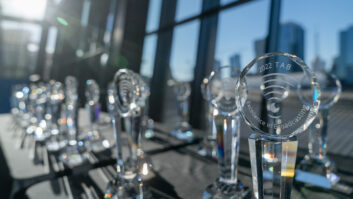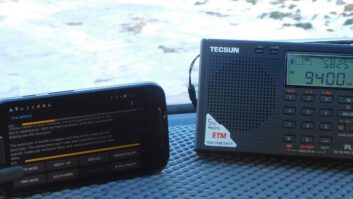GWARDAMANĠA, Malta — The passage of time and changes in listener demographics have pushed many state-owned broadcasters in Europe to refresh their offerings. This has resulted in multiple attempts at creating formats and transmitting programs that address new generations of listeners.
In Malta, this metamorphosis is still slowly, albeit successfully, taking place. One example is that of Radju Malta 2, part of the country’s public broadcaster, Public Broadcasting Services, headquartered in Gwardamanġa.


Ray Bajada, popular Maltese presenter and producer
of the 1980s, has reinvented Radju Malta 2
Spearheading the whole transformation is Ray Bajada, a veteran radio presenter and producer who was part of a team of dynamic “radio personalities” three decades earlier when Radju Malta 2 had no less successfully undergone a major overhaul that integrated it tightly into the radio scene of the 1980s.
REAL CHALLENGE
Sadly, that same format was carried, cobwebs and all, into the 1990s and left to rot away at a time when radio was emerging as a highly competitive medium in a surging technological environment with its inevitable realities of convergence, streaming and digital strictures.
“I simply refused to believe that the public station had been left to deteriorate to such a state,” said Bajada. “Shock turned to anger over the following months and that’s when the idea of doing something about it started brewing.”
He thus began planning his strategy. Renewing the station, which had since been renamed Ten Sixty-Six (106.6), and aired parliamentary sittings and a loop of mediocre Maltese songs, was not going to be an easy task for him, but he knew what he was getting into.
“The pool of programs lumped in on this station included washed-out has-beens, politically-sensitive contributors and all the unwanted rubbish that they had decided to clear out of Radju Malta 1,” he said. The old flagship had taken over from the foreign-run retransmission cable radio system introduced during colonial times.
The new digital studios at Radju Malta 2 cried out for a rethink of the whole radio set-up. The only redeeming factor until then had been public station Magic Malta, successfully formatted by Carlo Borg Bonaci, one of Malta’s most sought-after DJs, into a professional commercial station catering to a specific target audience and generating revenue.

Familjit’ Għada (Tomorrow’s Families) discusses family,
parenting issues and airs on Radju Malta 2 Tuesdays
11:30 a.m–1 p.m. and again on Thursdays at 8 p.m
Entrusted with the Radju Malta 2 project, Bajada first had to get to grips with the new digital ecosystem. Here was a 1980s radio presenter/producer about to take a blind leap into the future.
“I had only a one-hour chat with the British engineer who was setting up the software and leaving the day after,” recalls Bajada, “which is why I still call that day ‘Historic Wednesday!’ That evening at home I panicked. It felt like they had just put me in the cockpit of a space shuttle, given me the keys and said, here, you can fly.”
MAKEOVER
Radju Malta 2 today focuses on training and introducing new people to radio. Its programming pool contains a mixture of experienced broadcasters, Bajada himself included, and several new names from all age groups and who are discovering radio.
“The digital library, for too long abandoned, now covers approximately 18,000 items and is growing,” Bajada explains. “Apart from our FM service, Radju Malta 2 is also now broadcasting online, integrating social media and serving as a news portal and a source dedicated to the circulation of art, different perspectives and the environment.”
The station acts as the seeding ground for new ideas. A collaboration has even begun between the station and the Malta College of Arts, Science and Technology so as to integrate programming related to its educational curriculum and to also offer training for the students of this multimedia-oriented school.
“Radju Malta 2 exists on a skeleton budget,” said Bajada. “A good 50 to 60 percent of its programs are delivered free of charge by people who have always wished to work in radio but were never given the chance. Today these volunteers provide good-quality broadcasting on a national platform. We need more of them,” he said.
“We want to train them and to gradually put them into the groove. Hopefully, Radju Malta 2 will continue to metamorphosize into a creative broadcasting pool for the future, as well as becoming the first national Web channel on this Mediterranean island.”
Charles Flores reports on the industry for Radio World from Sliema, Malta.












